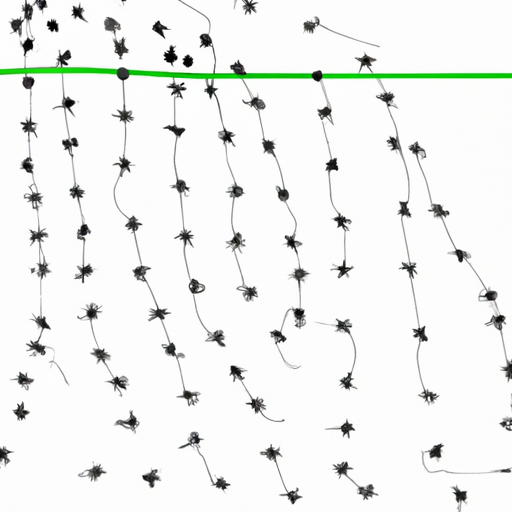What Factors Affect the Lifespan of Gnats?
Gnats are small, flying insects that can be found in many different environments. They have a relatively short lifespan, typically ranging from a few days to several weeks. However, there are several factors that can affect the lifespan of gnats and determine how long they live.
Temperature is one of the most important factors affecting the lifespan of gnats. In general, warmer temperatures tend to shorten their life span while cooler temperatures can extend it. This is because warm temperatures speed up their metabolism and cause them to use up energy more quickly than when it is cooler outside. Additionally, high humidity levels can also reduce the lifespan of gnats as they require dry conditions for survival.
The availability of food sources also plays an important role in determining how long gnats live. Gnats feed on sugary substances such as nectar and fruit juices which provide them with energy for flight and reproduction. If these food sources are scarce or not readily available then this will reduce their life expectancy significantly as they will not have enough energy to survive for very long periods of time without sustenance.
Finally, predation by other animals such as birds or spiders can also drastically reduce the lifespan of gnats if they become preyed upon regularly by these predators in their environment. Therefore, if there is an abundance of predators present then this could lead to a shorter life span for any given population of gnats due to increased predation pressure on them from other animals in the area
How to Identify Different Types of Gnats and Their Lifespans
Gnats are small, flying insects that can be found in many different environments. They come in a variety of shapes and sizes, and their lifespans vary depending on the species. Identifying the type of gnat you have is important for understanding its behavior and lifespan. Here are some common types of gnats and their lifespans:
Fungus Gnats: Fungus gnats are small, dark-colored flies with long legs and antennae. They feed on decaying organic matter such as fungi or plant roots. The adult fungus gnat has a lifespan of about two weeks, while the larvae can live up to three months before pupating into adults.
Eye Gnats: Eye gnats are tiny black flies that feed on human tears or sweat from eyes, noses, ears, or other moist areas of skin. They have short lifespans ranging from one to two days as adults but can survive up to four weeks as larvae before pupating into adults.
Fruit Flies: Fruit flies are small yellowish-brown flies with red eyes that feed on overripe fruits and vegetables in kitchens or pantries. Adult fruit flies typically live for about 30 days while larvae can survive up to 10 days before pupating into adults.
Sand Flies: Sandflies are tiny black biting insects found near water sources such as rivers or lakes where they breed in mud banks or damp soil deposits near vegetation like grasses or shrubs. Adult sandflies typically live for about one week while larvae can survive up to three weeks before pupating into adults .
Mosquitoes : Mosquitoes are large flying insects with long legs and antennae that feed on blood from humans and animals alike . Adult mosquitoes typically live for about two weeks while larvae can survive up to 10 days before pupating into adults .
How to Prevent Gnat Infestations in Your Home
Gnats are small, pesky insects that can be a nuisance in your home. They can be difficult to get rid of once they have infested an area, so it is important to take steps to prevent them from entering your home in the first place. Here are some tips for preventing gnat infestations in your home:
1. Keep windows and doors closed when possible. Gnats are attracted to light and will enter through open windows or doors if given the chance. Make sure all windows and doors are closed tightly when not in use, especially at night when gnats tend to be most active.
2. Clean up any food or drink spills immediately. Gnats feed on sugary substances such as spilled soda or juice, so make sure you clean up any spills right away before they attract gnats into your home.
3. Use screens on windows and doors if possible. Screens will help keep out flying insects such as gnats from entering your home through open windows or doors while still allowing air flow into the house during hot summer months when you need it most!
4. Check for standing water around the outside of your house regularly and remove it if found . Standing water is a breeding ground for many types of insects including gnats, so make sure there isn’t any around the outside of your house that could attract them inside!
5 . Use insecticides specifically designed for killing gnats . If you find yourself with an existing infestation of gnats inside your home, using insecticides specifically designed for killing these pests can help get rid of them quickly and effectively without having to resort to more drastic measures such as fumigation or tenting services which can be costly and time consuming!
Natural Ways to Get Rid of Gnats and Keep Them Away for Good
Gnats are small, pesky insects that can be a nuisance in the home. They are attracted to moist areas and feed on decaying organic matter, such as fruit and vegetables. Fortunately, there are several natural ways to get rid of gnats and keep them away for good.
The first step is to identify where the gnats are coming from. Gnats often breed in damp soil or standing water, so check around your house for any potential sources of moisture. If you find any standing water or overly damp soil, make sure to dry it out completely before proceeding with other methods of control.
Next, you can use natural repellents such as essential oils or vinegar solutions to keep gnats away from your home. Essential oils like peppermint oil or eucalyptus oil have strong odors that repel many types of insects including gnats. You can mix a few drops of essential oil with water in a spray bottle and spray it around windowsills and doorways to create an invisible barrier against these pests. Vinegar solutions also work well; simply mix equal parts white vinegar and water in a spray bottle and apply it around areas where you’ve seen gnat activity for best results.
Finally, you can use traps to capture existing populations of gnats before they have a chance to reproduce further infestations inside your home. Traps come in various forms but all work by luring the pests into an enclosed space where they cannot escape once inside; some traps even contain pheromones that attract male gnats specifically so they cannot mate with female counterparts outside the trap area!
By following these simple steps, you should be able to get rid of existing populations of gnats quickly while also preventing future infestations from occurring inside your home for good!
The Benefits of Having Gnats Around: What Do They Do for the Environment?
Gnats are small, flying insects that can be found in many different environments. While they may seem like a nuisance, gnats actually play an important role in the environment. Here are some of the benefits of having gnats around:
1. Pollination: Gnats are important pollinators for many plants and flowers. They help to spread pollen from one plant to another, which is essential for plant reproduction and growth. This helps to ensure that plants have enough food sources available for other animals and insects in the area.
2. Food Source: Gnats provide a food source for other animals such as birds, frogs, lizards, spiders and even bats! These animals rely on gnats as part of their diet so it’s important to keep them around if you want these species to thrive in your area.
3. Natural Pest Control: Gnats can help control pest populations by eating smaller insects such as aphids or mites that may otherwise damage crops or gardens if left unchecked.
4. Soil Fertility: The larvae of certain types of gnat feed on decaying organic matter which helps break down this material into nutrients that can be used by plants growing nearby – this helps improve soil fertility over time!
Overall, having gnats around is beneficial for both humans and the environment alike! Not only do they provide a food source for other animals but they also help with pollination and natural pest control while improving soil fertility at the same time – all things we should be thankful for!

